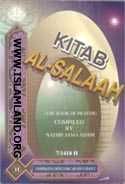Kitab Al-Salaah (The book of Prayer)

Ghusl
(Total Bath)
Ghusl in Islam means the bathing of the entire body with water. Proof
of its legitimacy is embodied in the Holy Qur'an as follows:“ And
if ye are in a state of ceremonial impurity, bathe your whole body”
(Qur'an 5:6).
Occasions when Ghusl is Required as an obligatory Act
Ghusl is required as an obligatory act in the following cases:
- After the discharge of semen as a result of stimulation
whether awake or asleep (i.e. in a wet dream). This state is known in
Arabic as "JUNUB". If, after the dream no wetness is traced in one's
clothing, bathing is not obligatory. However, in case wetness is found
but without recalling any dream, performing Ghusl is obligatory.- After sexual intercourse (or the mere coming together of the
two organs of a man and a woman, even though there may be no actual
ejaculation) performing Ghusl is required.- Following a period of menstruation, a woman is required to
perform Ghusl.- At the end of 40 days after childbirth, a woman is required
to perform Ghusl but if the bleeding stops before completing the 40
days period, then she must make the Ghusl as soon as the bleeding
stops.- When a Muslim dies, Ghusi is required for him/her except for
the Jihad Martyr (Shahead).
Occasions for which Ghusl is preferred
Ghusl is recommended in the following cases:
- Before going to Jumah Congregational (Friday Prayer).
- Before going to Eid Prayers (Muslim annual feast prayers).
- Before undertaking Umrah or Hajj (Pilgrimage to Makkah).
- Upon washing a corpse. (According to many scholars, the
performance of Ghusl is preferred for a person who washes a corpse).- When a disbeliever reverts to Islam.
Essential Requirements of Ghusl
There are two essential requirements which need to be fulfilled for
Ghusl to be valid. These are as follows:
- Intention to perform Ghusl is necessary because it is the
dividing line between acts performed as a mere custom and deeds which
are rewardable acts of worship. However, the intention is only by heart
and need not be uttered.- The entire body should be washed. Water should reach and flow
freely over every part of the body.
How Ghusl is Performed
Besides the above two essential requirements, there are also other
voluntary acts recommended for Ghusl. Both the essential and the
voluntary acts are now integrated here below to demonstrate how the
Prophet (peace be upon him) used to perform the Ghusl:
- Intend by heart to perform Ghusl.
- Wash both hands up to the wrists three times.
- Wash the sex organs properly.
- Perform Wudhu as usual (in the manner already discussed)
except, that the washing of the feet would be delayed until later when
all the rest of the body is bathed.- Pour water over the head three times, massaging the hair to
allow water to reach its roots.- Pour water liberally over the entire body, beginning with the
right side and then, the left side ensuring that no part of the body is
untouched by water such as the armpits, inside the earlobes, inside the
navel, between the fingers and toes, etc.- Finally, move a little further from where you were and wash
your feet, beginning with your right foot and then, the left.Notes:
- A woman will perform Ghusl just as a man does, except, that
if she has plaited hair, she need not undo it. She only needs to throw
three handfuls of water over her head (this is for the Junub [the one
who is in the state of major impurity after sexual intercourse or semen
discharge] but for the one who has just finished her monthly period or
post-birth period, she must undo her plaited hair).- The person may after completing the Ghusl recite the
supplication for concluding Ghusl which should be recited outside the
toilet/bathroom and which is the same as the one recited after
completing Wudhu.
Acts Forbidden to Persons who are required to Perform Ghusl
Persons required to perform Ghusl are forbidden to undertake certain
acts. These are as follows:
- Any type of prayer whether obligatory or voluntary.
- Circumambulating the Ka'abah (Tawaf).
- Touching or carrying the Holy Qur'an. However, the
prohibition does not apply to other books which contain Qur'anic
passages such as commentaries of the Holy Qur'an or works of Islamic
jurisprudence.- Reciting the Holy Qur'an.
- Staying Inside the Mosque.
